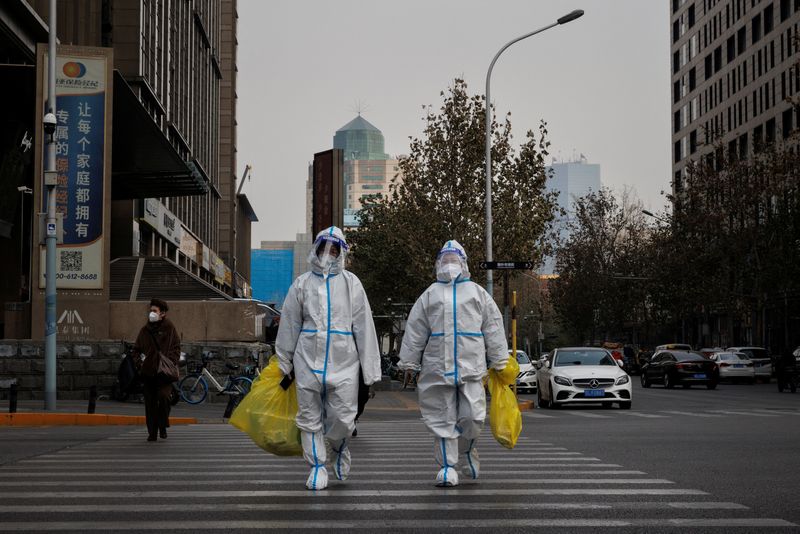‘It’s dead out here’: China’s slow exit from zero-COVID By Reuters

© Reuters. Pandemic prevention workers in protective suits cross a street as coronavirus disease (COVID-19) outbreaks continue in Beijing, December 9, 2022. REUTERS/Thomas Peter
2/5
By Ryan Woo, Martin Quin Pollard and Josh Horwitz
BEIJING (Reuters) -Judging by Friday’s quiet streets in China’s capital Beijing and the reluctance of some businesses to drop COVID curbs, enduring anxieties about the coronavirus are likely to hamper a speedy return to health for the world’s second-largest economy.
Although the government on Wednesday loosened key parts of its strict “zero-COVID” policy that has kept the pandemic largely at bay for the past three years, many people appear wary of being too quick to shake off the shackles.
In the central city of Wuhan, where the new coronavirus erupted in late 2019, there were more signs of life with some areas busy with commuters on Friday. But residents say a return to normal is a long way off.
“They’ve relaxed the measures but still there’s nobody about,” said a taxi driver surnamed Wang, who didn’t want to give his full name.
“You see these roads, these streets … they ought to be, busy, full of people. But there’s no one. It’s dead out here.”
Yet China has been anything but placid during the past few weeks, with protests against COVID curbs in many cities that marked the biggest show of public discontent since President Xi Jinping came to power a decade ago.
Some of those protesters, tracked down by China’s security apparatus, now face an anxious wait about their fate.
CHANGING MIND-SET
Little more than a month after the National Health Commission stressed commitment to its strict virus containment policy, saying it was “putting people and lives first”, authorities have changed tack and are now telling people they have less to fear.
The commission announced on Friday that they will convert temporary facilities used for treating COVID patients into permanent hospitals to boost treatment efforts.
Zhong Nanshan, a prominent Chinese epidemiologist, said that 99% of people now infected with the virus would recover in 7 to 10 days, in comments reported by the People’s Daily, controlled by the ruling Communist Party.
But there are signs the reassuring new message has still to convince many of the country’s 1.4 billion people.
With the need for tests dropped and most infected people now being allowed to isolate at home, some have embraced the new freedoms. For others, habits formed under months of stifling lockdowns, are proving hard to break.
On the Beijing subway, many seats were empty on Friday night during what should have been rush hour, even though the city this week scrapped the need to show negative tests to ride trains or enter offices.
Some downtown restaurants were deserted at lunchtime.
Amid the caution, state-broadcaster CCTV announced further easing, with tourism and entertainment venues – including theatres, libraries, internet cafes and table game centres no longer requiring COVID tests and health codes.
China’s tally of 5,235 COVID-related deaths is a tiny fraction of its population of 1.4 billion, and extremely low by global standards. Some experts have warned that toll could rise above 1.5 million if the exit is too hasty.
‘CHAOS’ AHEAD
Chinese regulators and state-owned banks are taking steps to split staff at their workplaces in Beijing, sources told Reuters, as businesses brace for a possible spike in COVID cases.
Manufacturers remain cautious too, retaining COVID curbs until they get a clearer picture of just how workplaces will be affected by the easing of stringent measures.
Businesses told Reuters they were expecting to have to grapple with long periods with workers off sick that could hamper operations, perhaps for months.
While authorities have scrapped testing as a pre-requisite for many activities, hotpot chain Haidilao said it would continue to require daily PCR tests for staff at its dine-in outlets in Beijing.
Analysts and business leaders expect China’s economy to rebound late next year as it follows the rocky path trodden by the rest of the world to open up and try to live with the disease.
China’s battered yuan currency climbed to a three-month high early on Friday and its stock markets rose as investors looked beyond poor data to growth prospects.
Noel Quinn, chief executive of HSBC, which makes the bulk of its revenue in the Greater China region, told a financial forum in Shanghai that China’s new measures represented “meaningful progress”.
“I very much hope that they can be an important stepping stone towards the full reopening of mainland China’s borders as soon as practicable,” he told the Shanghai Bund Summit via video link.
A surge in infections would likely depress economic growth in the next few months, however.
The China Association of Automobile Manufacturers warned that large-scale COVID infections would have an “adverse impact” on the auto market next year.
“There’s going to be chaos,” said Jeffrey Goldstein, a China-based consultant who helps foreign brands manufacture goods in Asia.
“China’s three years behind, so what’s going to happen in China is what happened in the rest of the world.”
A Reuters poll forecast China’s growth to slow to 3.2% in 2022, far below the official target of about 5.5%, marking one of the worst performances in almost half a century.
For all the latest Business News Click Here
For the latest news and updates, follow us on Google News.
